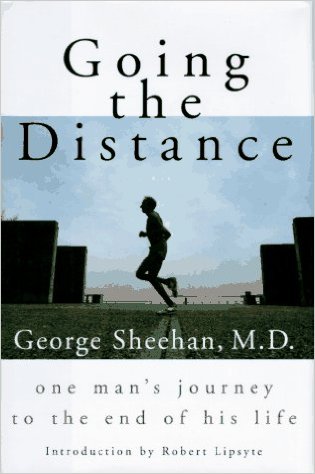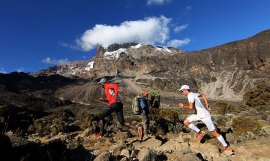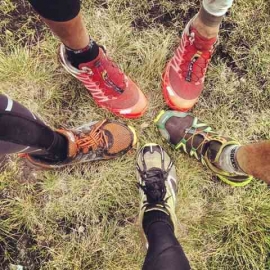更多乔治希恩编写的书籍见:
George A. Sheehan(乔治希恩)跑步书籍合集(附PDF电子书网盘下载地址)
//www.nduoke.com/shujibaike/george-sheehan-books
部分精选:
Running & Being: The Total Experience_George Sheehan_1978/1998/2013/2014
This Running Life_George Sheehan_1980
George Sheehan on Running to Win: How to Achieve the Physical, Mental and Spiritual Victories of Running_George Sheehan_1994
Going the Distance: One Man's Journey to the End of His Life_George Sheehan_1996
跑步圣经_Running & Being简体中文版_(美)乔治·希恩着;郭佳译_2007
跑步圣经:我跑故我在_Running & Being简体中文版_乔治·希恩George Sheehan著;于嘉译_2014
愈跑,心愈强大:跑步教父席翰医生教你成为自己的英雄_The Essential Sheehan繁体中文版_乔治席翰George Sheehan著;游淑峰译_2015
Going the Distance 简介:
In his posthumous memoir, one of the world's great master runners tells the honest and moving story of his battle against cancer and the final race of his life. A book for anyone touched by major illness or death, Going the Distance is an inspiring book by a man who wrote eloquently about the experience of living, of pushing to the limit as an athlete, and arriving at the finish line a changed person.
From Publishers Weekly
Although it was cancer that prompted this memoir by the cardiologist and runner who died in 1993, its message is less to those with terminal illness and more to older individuals. Sheehan (Running and Being) did not see aging as a period of decline, but rather of growth and opportunity, "a game of verve and imagination and excitement." He believed that the very young and the very old share two great yearnings: for love and for knowledge. Because distance running was the center of his life for 20 years after he left his medical practice, Sheehan has a cogent and coherent philosophy of exercise and play, which he considered as essential to well-being as an alert mind. A loner despite having 12 children, Sheehan felt that he had at last achieved intimacy with his family after 40 years of marriage, i.e., he finally became an adult. He approached death as "a self in evolution," and his book may inspire others to do likewise.
Copyright 1996 Reed Business Information, Inc.
From Library Journal
With Sheehan's death in 1993, every runner felt a sense of loss. Viewed by many as a pioneer in sports medicine, Sheehan was the acclaimed guru for the running community, publishing seven books on the subject, including the best-selling Personal Best (Rodale, 1989). When he was diagnosed with inoperable prostate cancer in 1986, Sheehan dedicated his remaining years to detailing "what dying actually means to the person undergoing it." He lost the battle with cancer but ultimately won the greater struggle of finding peace of mind. This frank, inspiring tale by the man Newsweek called "the philosopher of sport" is a useful guide for those affected by a serious illness. Recommended for all public libraries.?Larry Robert Little, Penticton P.L., B.C.
Copyright 1996 Reed Business Information, Inc.
From Booklist
Sheehan, the running cardiologist with several popular books on running to his credit, succumbed to prostate cancer in 1993. His account of approaching that eventuality combines self-reflection and observations on individual and social life. A loner, he speaks bluntly of relations with his family, betraying, some may feel, a selfishness that serves to indicate that he is human, after all, and no paragon. Sheehan says his early running was done to attain goals and set records, but in later years, he did it more to be with fellow runners. He also intriguingly observes that converts to running are driven by a desire to shorten periods of helplessness rather than to lengthen their lives. His account of his cancer diagnosis and treatment, as well as their effects on his family and professional lives, is thought-provoking and, occasionally, refreshingly humorous. This is a fitting conclusion to Sheehan's writing on running and health that should please athletes, physicians, and patients alike. William Beatty
From Kirkus Reviews
When Sheehan (This Running Life, 1980, etc.) was diagnosed with inoperable cancer, he turned his physician's eye and writer's ear to the subject of his own mortality, producing this posthumous volume. Dr. Johnson once observed that knowing that death is imminent has a wonderful way of focusing the mind. Dr. Sheehan was never someone who had trouble focusing in his writing. One of the great apostles of running, he wrotes columns and books that were always wonderfully lucid explorations of the balance between body, mind, and spirit. Not surprisingly, this volume, tracing his final journey toward death from prostate cancer, is more of the same, only more intense. The book, he says in the introduction, really has three subjects: It's ``about what dying actually means to a person undergoing it . . . a communion with others experiencing dying. And . . . an evaluation of my life.'' The first essay clearly began as a rumination on turning 70, but when Sheehan received the diagnosis of his cancer, it was transmuted into a very different story. And an inspiring story it is. Sheehan is completely frank about the indignities of fatal illness--pain and painkillers, loss of appetite and unappetizing food, constant fatigue and a sudden loss of powers. He is also mercilessly honest in self-evaluation. Finally, he draws on a lifetime of reading and writing to produce a luminous examination of those larger questions that we don't really confront until we must. From Epictetus to William James, Unamuno to Thornton Wilder, Sheehan has a knack for finding the right thought and thinker. In 1993, he died at peace with himself and his life, and left behind this last glowing gift. Almost unbearably moving at times, a must-read book for anyone facing severe illness or loss. -- Copyright ©1996, Kirkus Associates, LP. All rights reserved.
From the Inside Flap
In his posthumous memoir, one of the world's great master runners tells the honest and moving story of his battle against cancer and the final race of his life. A book for anyone touched by major illness or death, Going the Distance is an inspiring book by a man who wrote eloquently about the experience of living, of pushing to the limit as an athlete, and arriving at the finish line a changed person.
Going the Distance 书评:
I bought this book when it first came out in 1996. I have now just gotten around tor reading it (1999). I am bad about putting off things I suspect are going to be very good (Delayed gratification).
One of the great pioneers of not just running, but healthy living via serious play, George Sheehan, wrote a book that is the final work of his life. Subtitled, One Man's Journey To The End Of His Life," Sheehan has his eyes wide open, avoiding clinging to pure emotionalism and the could-of-should-of-would-of mentality, looking deep into his own felings and observations.
This book is not for everyone. It is for those that choose to face life and death with their eyes open -- willing to face themselves and what makes them tick.
Just as you cannot put a bandaid on cancer, George Sheehan doesn't try to cover up his humaness. He fully embraces what he was, what he is now, and acknowledges the similarity between the very young and the very old.
Unfortunately, this book will hard to find if you have an interest . . . Long overdue for a reprint.
I would give this book 10 stars if I could. First, I should mention this is *not* a book about running any more than Moby-Dick is a book about whales. Rather, it is a discourse on how best to live one's life, written by someone near the end of his. I read this every year, and every year I'm amazed at how wise Dr. Sheehan was. Like Shakespeare or the Bible, it opens up to me the more I read it, and every time I learn something new, if only because I've changed and understand it better through experience. It helps me measure my own growth. I can't express what an influence it has been.




